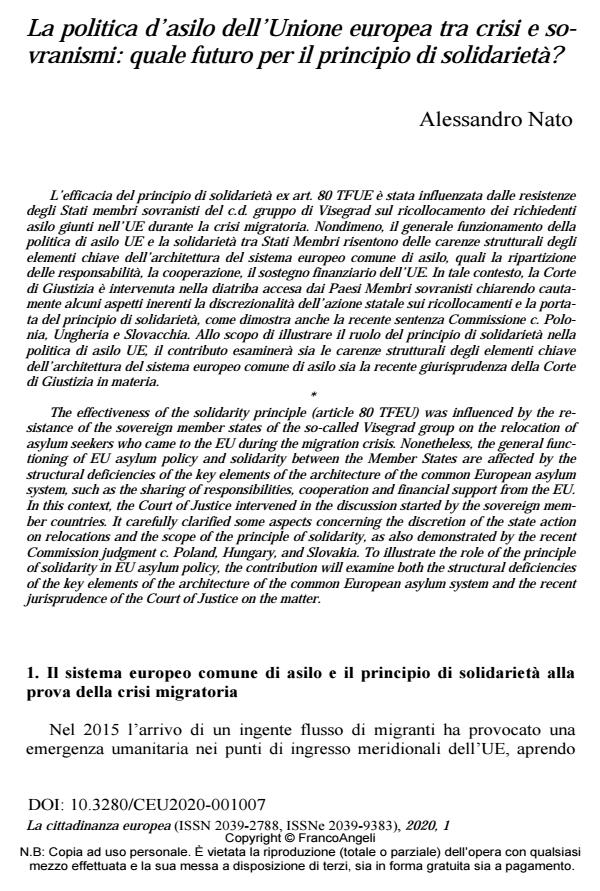La politica d’asilo dell’Unione europea tra crisi e sovranismi: quale futuro per il principio di solidarietà?
Journal title CITTADINANZA EUROPEA (LA)
Author/s Alessandro Nato
Publishing Year 2020 Issue 2020/1
Language Italian Pages 23 P. 191-213 File size 332 KB
DOI 10.3280/CEU2020-001007
DOI is like a bar code for intellectual property: to have more infomation
click here
Below, you can see the article first page
If you want to buy this article in PDF format, you can do it, following the instructions to buy download credits

FrancoAngeli is member of Publishers International Linking Association, Inc (PILA), a not-for-profit association which run the CrossRef service enabling links to and from online scholarly content.
The effectiveness of the solidarity principle (article 80 TFEU) was influenced by the re-sistance of the sovereign member states of the so-called Visegrad group on the relocation of asylum seekers who came to the EU during the migration crisis. Nonetheless, the general functioning of EU asylum policy and solidarity between the Member States are affected by the structural deficiencies of the key elements of the architecture of the common European asylum system, such as the sharing of responsibilities, cooperation and financial support from the EU. In this context, the Court of Justice intervened in the discussion started by the sovereign member countries. It carefully clarified some aspects concerning the discretion of the state action on relocations and the scope of the principle of solidarity, as also demonstrated by the recent Commission judgment c. Poland, Hungary, and Slovakia. To illustrate the role of the principle of solidarity in EU asylum policy, the contribution will examine both the structural deficiencies of the key elements of the architecture of the common European asylum system and the recent jurisprudence of the Court of Justice on the matter.
- Il principio di solidarietà nell'Unione europea Ennio Triggiani, in GIORNALE DI DIRITTO DEL LAVORO E DI RELAZIONI INDUSTRIALI 170/2021 pp.235
DOI: 10.3280/GDL2021-170004
Alessandro Nato, La politica d’asilo dell’Unione europea tra crisi e sovranismi: quale futuro per il principio di solidarietà? in "CITTADINANZA EUROPEA (LA)" 1/2020, pp 191-213, DOI: 10.3280/CEU2020-001007